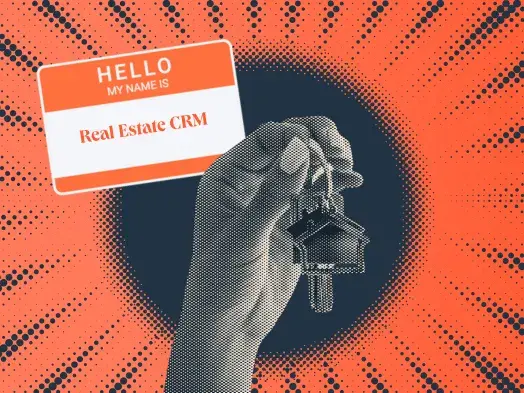
Managing relationships in real estate is more than just remembering names and dates — it’s about nurturing trust through every stage of the buying or selling journey. However, with high volumes of leads, complex transactions, and long sales cycles, real estate businesses’ CRM needs are uniquely demanding.
Real estate professionals rely heavily on innovative tools to manage their growing networks and workflows to stay organized and competitive. Customer Relationship Management (CRM) software plays a crucial role by streamlining communication, prioritizing follow-ups, and offering clear visibility into the sales pipeline — all of which contribute to closing deals more efficiently. According to the National Association of Realtors (NAR) 2024 Technology Survey, CRMs were among the top three tech tools that gave respondents (or their agents) the highest-quality leads in the last year.
In this article, we’ll break down the best CRM software for real estate businesses, complete with a comparison table, feature-by-feature analysis, and a how-to guide for choosing the right system for your team. Whether you’re a solo agent or running a large brokerage, you’ll find options that match your workflow and growth goals.
And yes, HubSpot is among the trusted CRMs real estate companies use to streamline operations and scale their client relationships efficiently.
Table of Contents
- What is a CRM for real estate?
- CRM Comparison Table
- Best CRM Software for Real Estate Businesses
- Benefits of CRM Software for Real Estate
- 5 Important Features for a Real Estate CRM
- How to Choose a CRM for Real Estate (Step-by-Step)
- Frequently Asked QuestionsWhat is the best CRM for real estate?
- Meet HubSpot, the Top CRM Choice for Real Estate Companies
What is a CRM for real estate?
A CRM for real estate is a software tool designed to help agents, brokers, and firms manage client relationships, property listings, and sales workflows more efficiently. It centralizes communications, tracks leads through the buying or selling process, and automates follow-ups — all tailored to the unique pace and complexity of the real estate industry.
Best CRMs for Nonprofit Organizations at a Glance
|
CRM |
Best For |
Key Features |
Pricing |
Free Trial |
|
HubSpot |
Growing real estate teams seeking an all-in-one solution |
Integrated marketing, sales & service hubs Customizable deal pipelines Email tracking & templates Meeting scheduler Lead scoring & automation Mobile app Website integration |
Free: $0 Starter: $9/month/seat Starter Customer Platform: $9/month/seat Sales Hub Professional: $90/month/seat |
Yes, 14 days |
|
Follow Up Boss |
Teams focused on lead response and conversion |
Automatic lead distribution Text & email from one inbox Lead source tracking Action plans & workflows Call recording Integration with lead sources |
Grow: $58/user/month (two free months included) Pro: $416/user/month (includes 10 users, additional users can be added at $41/month, two free months included) Platform: $833/user/month (includes 30 users, additional users can be added at $17/month, two free months included) |
Yes, 14 days |
|
Property Matrix |
Luxury real estate & international markets |
IDX website integration Multi-language support Commission tracking Marketing center Transaction management MLS integration |
Custom pricing only (must request a demo for price quote information; see here) |
Yes, 14 days |
|
Monday.com |
Teams wanting lead generation and CRM capabilities combined |
Built-in lead generation tools AI-powered lead scoring Behavioral automation Smart campaigns Custom-branded apps Open house tools |
Free CRM: $0/user/month (maximum two users) Basic CRM: $9/user/month Standard CRM: $12/user/month Pro CRM: $19/user/month Enterprise: Custom pricing only (must request a demo for price quote information; see here) |
No, demo scheduling required |
|
Real Geeks |
Budget-conscious agents and small teams |
Video email & texting Drip campaigns Transaction management Lead distribution Power dialer AI assistant |
Establish: $399/month (includes $250 sign-up fee) Grow: $699/month (includes $250 sign-up fee) Expand: $1,199/month (includes $500 sign-up fee) Conquer: $1,799/month (includes $500 sign-up fee) |
Yes, 14 days |
Best CRM Software for Real Estate Businesses
In real estate, staying organized while juggling multiple clients, properties, and transactions can feel overwhelming, but the right CRM makes all the difference. Modern real estate CRMs are explicitly designed for how agents work today, with features like mobile apps for updating notes during showings, automated follow-ups that nurture leads over months, and visual pipelines that track each deal from first contact to closing.
Below, I’ve covered the features and benefits that help real estate professionals save time, close more deals, and deliver exceptional client experiences. Take a look:
1. HubSpot
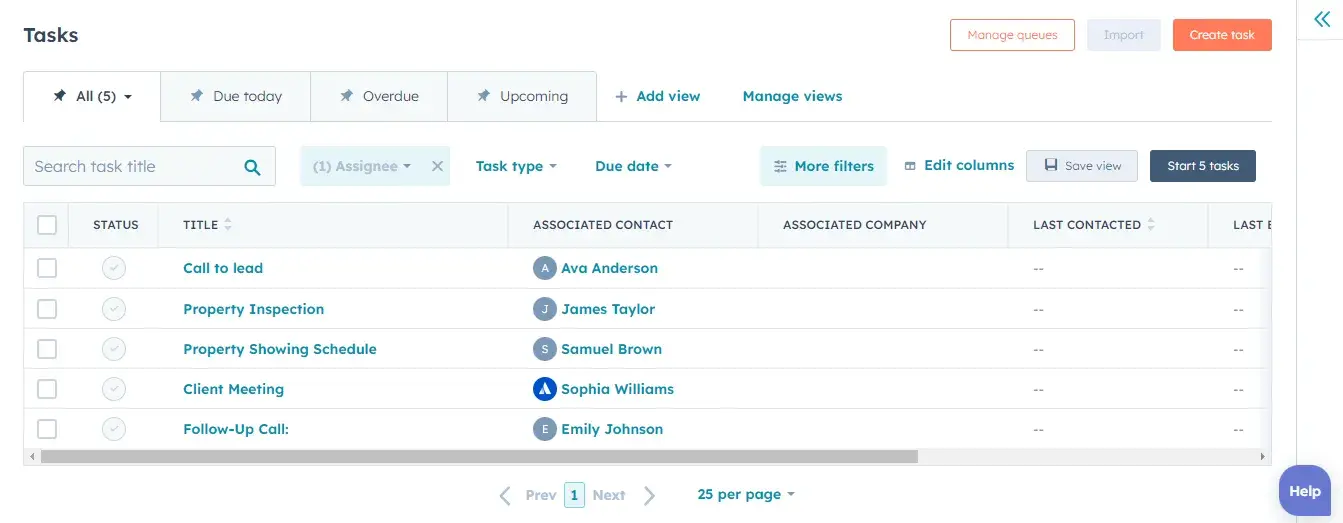
Best for: Growing real estate teams looking to scale operations while maintaining personalized client relationships through integrated marketing and sales tools.
Key HubSpot Features
- Customizable deal pipelines: Essential for real estate professionals to track properties through different stages (listing, showing, offer, closing) while visualizing their entire portfolio at a glance.
- Email tracking and meeting scheduler: Streamlines the showing scheduling workflow by allowing clients to book property viewings directly from emails, while agents can see when prospects open listing emails.
- Marketing Hub integration: Automates lead-nurturing campaigns based on property interests, automatically sending new listings to buyers based on their saved searches and preferences.
HubSpot Pricing (Sales Hub)
- Free: $0
- Starter: $9/month/seat
- Starter Customer Platform: $9/month/seat
- Sales Hub Professional: $90/month/seat
2. Follow Up Boss
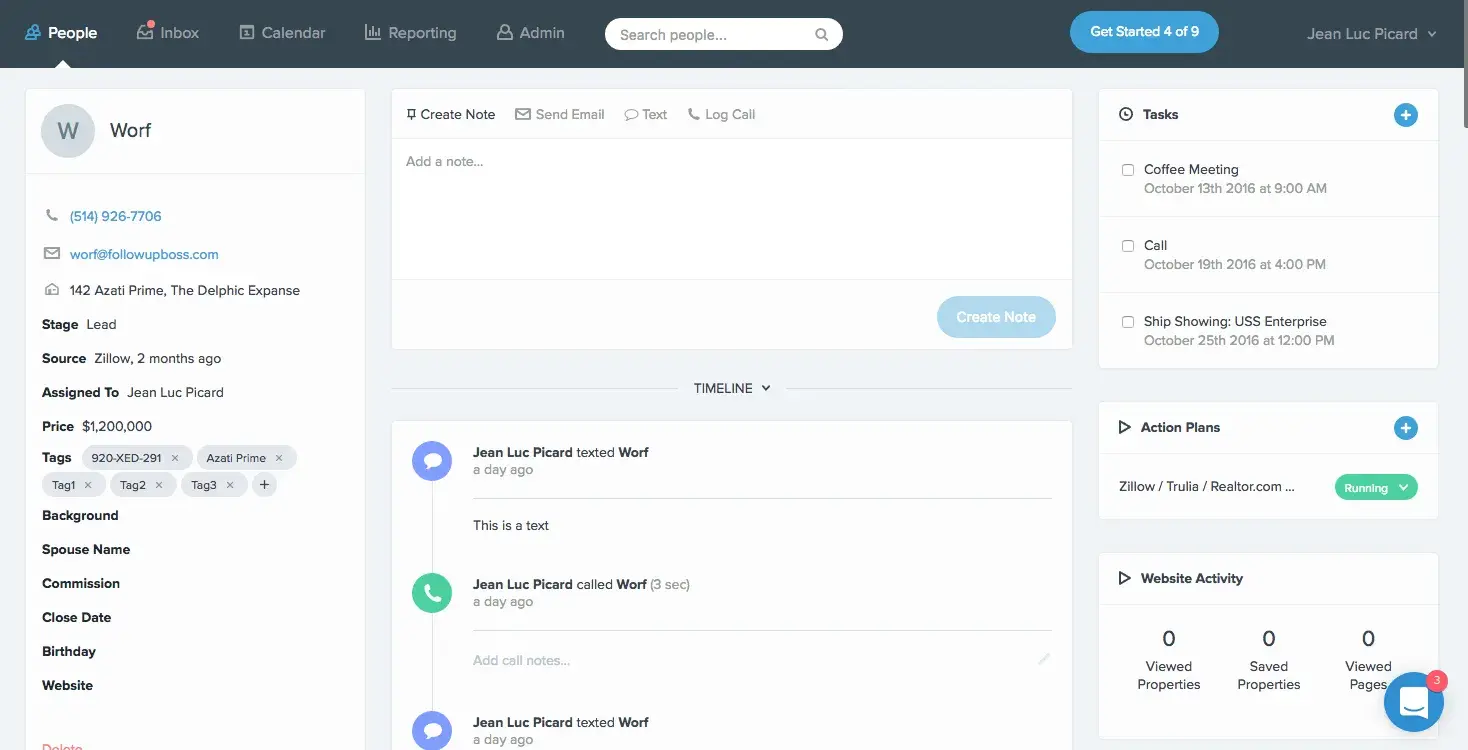
Best for: High-volume real estate teams focused on rapid lead response times and converting online leads into clients.
Key Follow Up Boss Features
- Automatic lead distribution: Crucial for real estate teams to instantly route incoming leads from Zillow, Realtor.com, or website inquiries to the right agent based on location, property type, or availability.
- Unified communication inbox: Consolidates the typical agent workflow of juggling texts, emails, and calls into one screen.
- 250+ lead dource integrations: Automatically imports and tracks leads from major real estate platforms, eliminating manual data entry and showing ROI for each marketing channel.
Follow Up Boss Pricing
- Grow: $58/user/month (two free months included)
- Pro: $416/user/month (includes 10 users, additional users can be added at $41/month, two free months included)
- Platform: $833/user/month (includes 30 users, additional users can be added at $17/month, two free months included)
3. Property Matrix
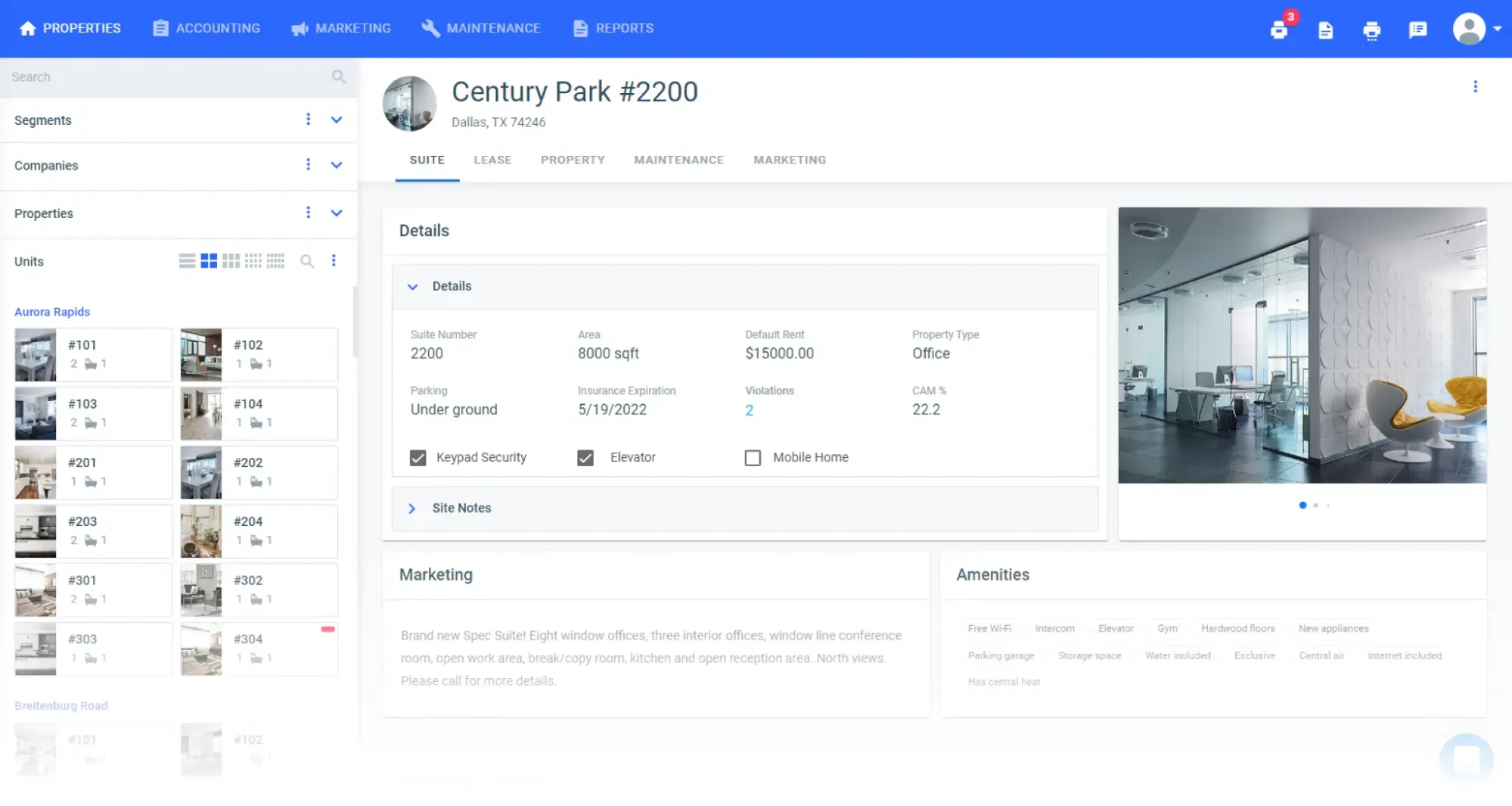
Best for: Established real estate agencies and property management companies needing comprehensive transaction tracking and trust management capabilities.
Key Propertybase Features
- Integrated trust accounting: Critical for real estate agencies handling client deposits and rental income, ensuring compliance with real estate trust account regulations.
- Multi-office management: Enables brokerages to oversee multiple locations from one dashboard, tracking agent performance, commission splits, and office-specific listings while maintaining centralized reporting.
- Automated commission calculations with Xero/MYOB integration: Streamlines sales workflows from listing to settlement, calculating agent commissions based on custom splits and syncing financial data with accounting software.
Property Matrix Pricing
- Custom pricing only (must request a demo for price quote information; see here)
4. Monday.com
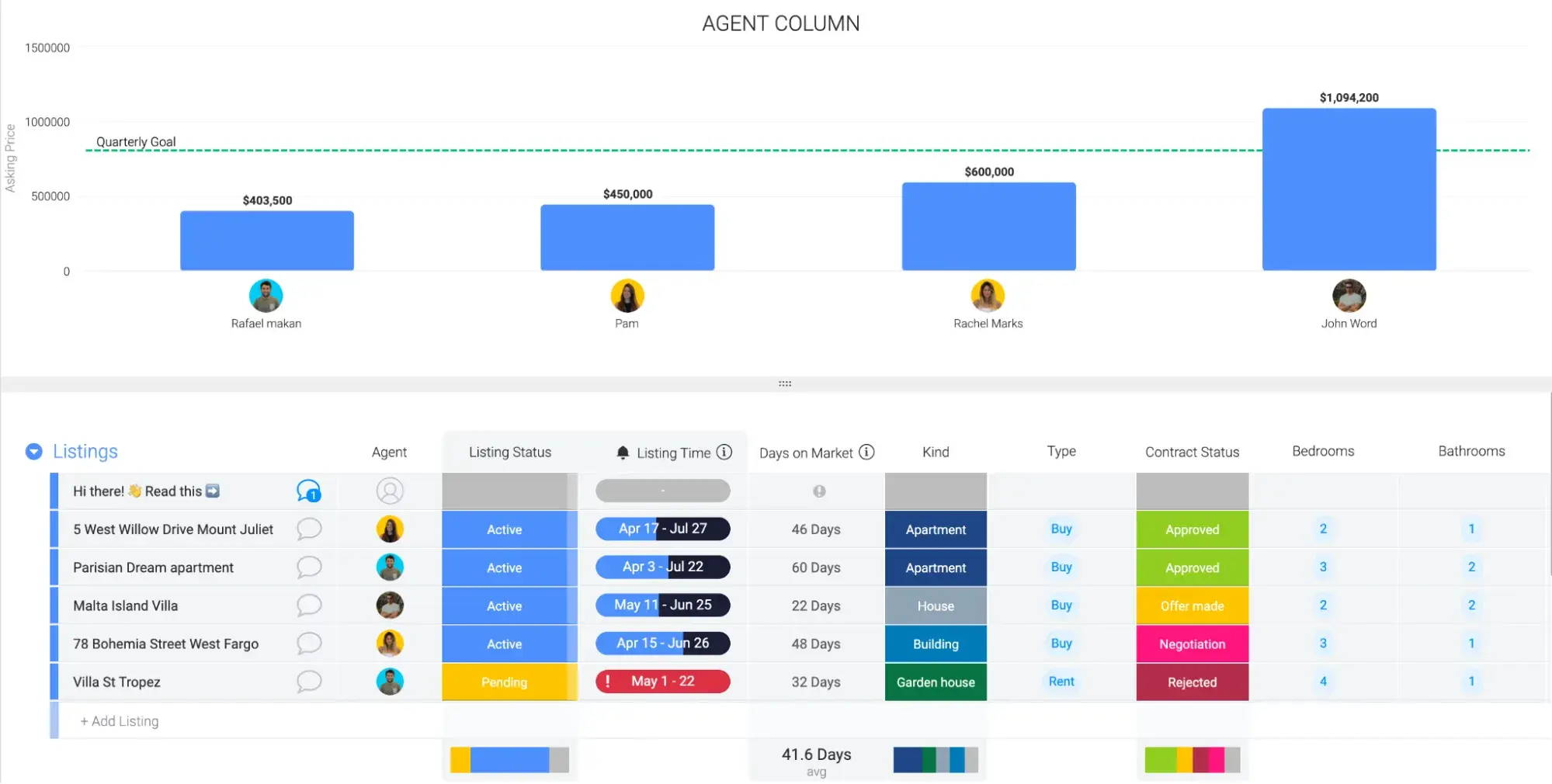
Best for: Real estate teams seeking a highly visual, customizable platform that adapts to unique workflows and scales from solo agents to large brokerages.
Key Monday.com Features
- Visual pipeline management: Perfect for real estate professionals who need to track multiple deals simultaneously, offering kanban boards, timeline views, and color-coded statuses.
- Custom automation builder: Streamlines repetitive real estate workflows, such as sending listing agreements after initial meetings, notifying team members when offers are received, or triggering inspection reminders based on contract dates.
- 200+ integrations, including Zillow and DocuSign: Automatically syncs new leads from major real estate portals while enabling digital signature workflows for contracts.
Monday.com Pricing
(Annual price based on team size)
- Free CRM: $0/user/month (maximum two users)
- Basic CRM: $9/user/month
- Standard CRM: $12/user/month
- Pro CRM: $19/user/month
- Enterprise: Custom pricing only (must request a demo for price quote information; see here)
5. Real Geeks
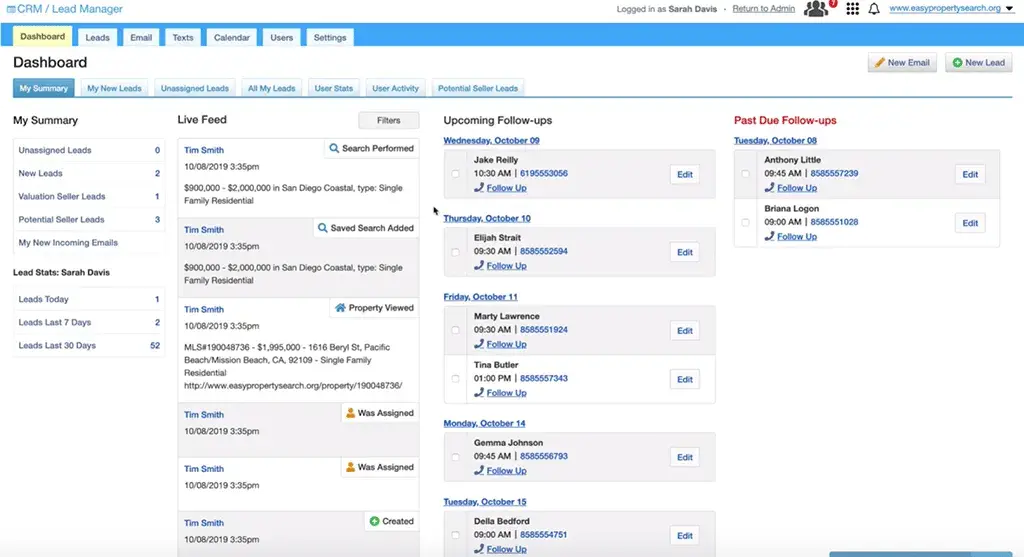
Best for: Growth-focused real estate teams wanting a complete lead generation ecosystem with built-in IDX websites, landing pages, and Facebook advertising tools.
Key Real Geeks Features
- IDX website with lead capture forms: Essential for real estate professionals to showcase MLS listings while automatically capturing visitor information through property search behavior.
- Facebook marketing integration: Streamlines the modern real estate marketing workflow by creating targeted Facebook ads for listings.
- Autoresponders with property alerts: Nurtures leads on autopilot by sending new listings matching their saved searches, market reports, and personalized property recommendations based on viewing history.
Real Geeks Pricing
For a 12-month term:
- Establish: $399/month (includes $250 sign-up fee)
- Grow: $699/month (includes $250 sign-up fee)
- Expand: $1,199/month (includes $500 sign-up fee)
- Conquer: $1,799/month (includes $500 sign-up fee)
Benefits of CRM Software for Real Estate
Eliminate Double-Booking and Missed Showings with Synchronized Scheduling
Real estate agents waste hours coordinating property showings, often double-booking themselves or missing appointments due to calendar conflicts across multiple properties and clients.
HubSpot’s meeting scheduler and calendar sync integrates directly with Google Calendar and Outlook, allowing clients to self-book property tours based on real-time availability. Agents can set buffer times between showings, block out personal time, and automatically send confirmation emails with property details. This turns a chaotic scheduling process into an automated system that respects agent and client time.
Convert More Leads by Targeting the Right Prospects at the Right Time
Not all real estate leads are equal. Some are ready to buy today, while others are just browsing. Agents waste time on tire-kickers without proper organization, while hot prospects go cold.
HubSpot’s list segmentation and lead scoring automatically organize contacts based on engagement level, property preferences, and timeline. Create dynamic lists like “Viewed 5+ properties in the last week” or “Downloaded mortgage calculator,” then trigger targeted campaigns to these high-intent segments. This precision targeting helps agents focus on prospects most likely to transact while nurturing others until they’re ready.
Never Lose Another Deal Due to Poor Communication or Missed Follow-Ups
Real estate deals die in the follow-up phase. Agents juggle dozens of active prospects while managing current transactions, inevitably neglecting timely communication. However, HubSpot’s sequences and workflow automation create fail-safe follow-up systems that run automatically. Set up sequences that send listing updates on day 1, schedule a call on day 3, and share market reports on day 7 — all personalized and timed perfectly.
When prospects engage, workflows can alert agents, assign tasks, or move deals to the next pipeline stage, ensuring consistent communication throughout the lengthy real estate cycle.
Make Data-Driven Decisions with Real-Time Performance Visibility
Brokers often discover problems too late — an agent’s conversion rate drops, a lead source stops performing, or deals stall in the pipeline — because they lack real-time visibility.
HubSpot’s customizable dashboards and automated reporting provide instant insights into critical metrics like average days on market, lead-to-showing conversion rates, and source ROI. Set up automated weekly reports showing each agent’s activities, pipeline value, and closed deals. With mobile access to these dashboards, brokers can spot trends immediately and coach agents before minor issues become major problems.
Stay Productive On-the-Go with Full Mobile Access to Your Database
Real estate happens in the field — at showings, open houses, and listing appointments — yet agents often can’t access critical information when they need it most.
HubSpot’s mobile CRM app provides full database access from any smartphone, letting agents update contact records during showings, log property feedback immediately, and access client history while standing in a home. This constant connectivity means agents capture critical details in the moment rather than relying on memory or notes that get lost between car seats.
5 Important Features for a Real Estate CRM
- Mobile CRM access with offline functionality: Real estate agents spend much of their time in the field — at showings, inspections, and listing appointments — making mobile access non-negotiable. Look for CRMs that offer full-featured mobile apps, not just stripped-down versions. Again, HubSpot’s mobile app lets agents update property notes during walk-throughs, scan business cards at open houses to instantly create contacts, and access complete client histories while negotiating offers. The offline sync capability ensures data captured at properties without cell service saves automatically when an internet connection returns.
- Customizable deal pipelines for different transaction types: Real estate transactions vary dramatically — residential sales, commercial leases, property management, and new developments all follow different workflows. Your CRM must accommodate multiple, customizable pipelines that reflect these unique processes. HubSpot allows teams to create separate pipelines for buyers vs. sellers, with stages like “Pre-approved,” “Touring,” “Offer Submitted,” and “Under Contract.” Teams can also set up automated actions when deals move stages, such as triggering inspection reminders or commission calculations.
- Deep MLS and real estate portal integrations: Manually entering lead data from Zillow, Realtor.com, or your MLS wastes precious time and introduces errors. HubSpot integrates with major real estate platforms through Zapier and native APIs, automatically creating contact records when leads inquire about listings. HubSpot also connects with IDX providers to sync property information and track which listings generate the most interest.
- Automated email and SMS marketing sequences: Following up with leads consistently over months requires automation, especially when nurturing hundreds of prospects simultaneously. HubSpot’s sequences feature enables agents to create multi-touch campaigns that automatically send new listing alerts, market updates, and personalized property recommendations based on search criteria. Plus, HubSpot tracks open rates and engagement, pausing sequences when prospects reply to ensure human touchpoints happen immediately.
- Commission tracking and transaction management tools: Real estate CRMs must go beyond contact management to handle the financial complexities of property transactions. HubSpot’s deal records can track commission splits, referral fees, and closing costs using custom properties, while its document management system stores contracts, disclosures, and closing documents directly on deal records.
How to Choose a CRM for Real Estate (Step-by-Step)
Step 1: Map your workflows.
Before evaluating any CRM, document your current real estate processes from lead capture to closing. Track how leads enter your system (website, portals, referrals), follow your communication touchpoints (initial contact, property tours, offers), and note transaction milestones (inspections, appraisals, closing).
Additionally, identify pain points like missed follow-ups, lost leads, or scheduling conflicts. This exercise reveals which CRM features will actually impact your business. For example, if you’re losing Zillow leads due to slow response times, prioritize CRMs with instant lead routing and mobile notifications.
Step 2: Identify must-have features.
Create a prioritized feature list based on your workflow mapping, distinguishing “must-haves” from “nice-to-haves.” Essential real estate CRM features typically include:
- Mobile access for property showings
- Automated lead capture from major portals
- Customizable pipelines for different property types
- Email/SMS automation for long-term nurturing
- Document storage for contracts
Also consider integration requirements (i.e., does the CRM connect with your MLS, transaction management software, or accounting tools?). Rank these features by impact on your daily operations to avoid paying for unnecessary bells and whistles.
Step 3: Compare ease of use and team fit.
Ultimately, the best CRM is one that your team uses. Schedule demos with your top choices and have agents test drive each platform with real scenarios — entering a new lead at an open house, scheduling property tours, or updating deal stages.
Evaluate the learning curve, mobile app usability, and intuitive interface. Consider your team’s tech comfort level; while power users might appreciate complex features, most agents need simplicity. Pay attention to:
- Available training resources
- Customer support quality
- Implementation assistance
These factors determine long-term adoption success.
Step 4: Check cost at scale.
Calculate total ownership costs beyond the advertised per-user pricing. Factor in:
- Setup fees
- Training expenses
- Data migration costs
- Charges for additional contacts or storage as you grow
Model costs for your team size, plus projected growth — some CRMs have steep price jumps at certain user thresholds.
Include potential add-ons like marketing tools, advanced reporting, or API access you might need later. Compare this against your average commission per deal to ensure ROI makes sense.
Also, here’s a pro tip: the cheapest option isn’t always the most cost-effective if it lacks features that help close more deals.
Step 5: Choose a flexible platform — like HubSpot.
Select a CRM that grows with your business rather than forcing you to switch systems later.
HubSpot exemplifies this flexibility, starting with a robust free tier for solo agents and scaling to enterprise features for large brokerages. The platform adapts to various real estate models — residential sales, commercial leasing, and property management — through customizable pipelines and properties.
Moreover, eXp Realty consolidated 100+ Google Group emails into one system using HubSpot’s Service Hub. HubSpot’s extensive integration ecosystem, regular feature updates, and unified marketing-sales-service platform ensure you (and your team) won’t outgrow the system as your real estate business evolves.
Frequently Asked Questions
What is the best CRM for real estate?
The best CRM for real estate depends on your specific needs, but HubSpot consistently ranks as a top choice due to its scalability and comprehensive feature set. For growing teams seeking an all-in-one solution, HubSpot offers the perfect balance of contact management, marketing automation, and sales tools.
Moreover, HubSpot’s free tier makes it accessible for solo agents, while its advanced features support large brokerages. The platform’s extensive integration ecosystem, mobile app, and customizable pipelines adapt to any real estate workflow, making HubSpot the most versatile option for teams planning long-term growth.
What features should I look for in a CRM for real estate?
Essential real estate CRM features include mobile access for property showings, customizable pipelines for different transaction types, and automated follow-up sequences for long sales cycles. Be sure to look for:
- MLS/IDX integration
- Lead capture from Zillow portals
- Contract document management
HubSpot delivers all these capabilities through its mobile app with offline sync, custom deal stages for buyers vs. sellers, and workflow automation for nurturing leads. Additional must-haves include:
- Commission tracking
- Calendar integration for showing schedules
- Marketing tools for listing promotion
All of these tools are available via HubSpot. The key is finding a CRM that handles both relationship management and transaction coordination, which HubSpot achieves through its unified database and automation tools.
Is HubSpot good for real estate?
Yes, HubSpot is excellent for real estate businesses of all sizes. While not exclusively built for real estate, HubSpot’s flexibility allows teams to customize it perfectly for property sales workflows.
Real estate professionals value HubSpot’s free CRM tier for getting started, robust mobile app for field work, and marketing hub for generating leads through property landing pages. The platform handles complex real estate needs through custom properties (for tracking commission splits, property details), multiple pipelines (residential vs. commercial), and automated sequences for long-term lead nurturing.
Additionally, HubSpot’s integration capabilities connect with real estate tools like Zillow and DocuSign, while its reporting features help brokers track agent performance and ROI. Many top-performing real estate teams choose HubSpot because it can scale from a solo agent to a multi-office brokerage.
How much does a CRM for real estate cost?
Real estate CRM pricing varies widely per user (typically, on a monthly or annual basis), with most professional solutions averaging $50 to $100 per user. HubSpot offers exceptional value with its free CRM tier, including contact management, deals, and basic features for unlimited users — perfect for agents testing CRM benefits.
When calculating ROI, consider that HubSpot’s automation and lead-nurturing features typically help agents close 1 to 2 additional deals annually, easily justifying the investment. Many teams start with HubSpot’s free tier and upgrade only when they need advanced features, making it the most budget-friendly path to CRM adoption.
Meet HubSpot, the Top CRM Choice for Real Estate Companies
In an industry where timing is everything and relationships drive success, real estate professionals need a CRM that keeps pace with their fast-moving, field-based work. HubSpot delivers the perfect blend of powerful automation and intuitive mobile access that today’s agents demand, from instantly capturing online leads to managing complex transactions across multiple properties.
Key Features Built for Real Estate Success
- Unified lead management across all sources: HubSpot automatically captures and routes leads from Zillow, Realtor.com, your native website, and social media into one centralized system. Plus, by using QR codes at open houses and automated form tracking, agents never lose another potential buyer or seller in the shuffle of multiple platforms.
- Visual pipeline customization for different property types: By using HubSpot, create separate pipelines for residential buyers, sellers, commercial properties, and rentals with custom deal stages matching your workflow. Moreover, track properties from initial inquiry through closing with automated task creation at each stage, ensuring nothing falls through the cracks during complex transactions.
- Mobile-first design for agents in the field: Use HubSpot’s top-tier mobile app to access your complete database, update property notes, and respond to leads instantly from showings. The offline sync capability lets you capture critical information at properties without connectivity, keeping your data current even in remote locations.
Proven Real-World Impact with HubSpot
North America Home Finance (NAHF) transformed its real estate investment operations using HubSpot, achieving remarkable results. Using HubSpot’s unified platform, NAHF grew from $200,000 to $62,000,000 in assets under management within one year.
Plus, thanks to HubSpot’s tracking and nurturing capabilities, the company dramatically improved its lead conversion, with 5,000 of its 13,000 total leads progressing through its sales lifecycle.
Ready to see how HubSpot can transform your real estate business? Get started with HubSpot’s free CRM today or schedule a personalized demo to explore advanced features.
![]()




![How & why to use sales scripts [+ 14 examples and templates]](http://nurseagence.com/wp-content/uploads/2025/07/sales-script-examples-hero-425x283.webp)








